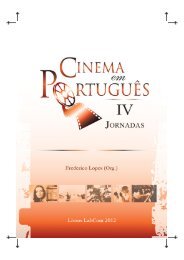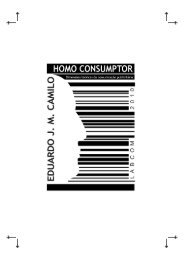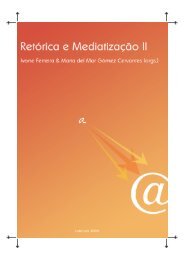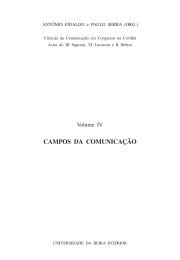Dizionario di retorica - Livros LabCom - UBI
Dizionario di retorica - Livros LabCom - UBI
Dizionario di retorica - Livros LabCom - UBI
You also want an ePaper? Increase the reach of your titles
YUMPU automatically turns print PDFs into web optimized ePapers that Google loves.
✐<br />
✐<br />
✐<br />
✐<br />
60 <strong>Dizionario</strong> <strong>di</strong> <strong>retorica</strong><br />
‘Perché non crederti? Se ciò che <strong>di</strong>ci fosse falso, avresti tutto da perderci;<br />
se fosse vero avresti tutto da guadagnarci’.→ merismo, partitio,<br />
<strong>di</strong>stributio.<br />
<strong>di</strong>zióne [s.f.] Lo stesso che → pronuntiatio, <strong>di</strong>ctio.<br />
docere [vb.] Far conoscere, istruire, informare i giu<strong>di</strong>ci su una causa. È il<br />
fine delle cause civili e si avvale <strong>di</strong> uno stile chiaro e semplice, come<br />
anche Cicerone afferma in accordo con i neoatticisti durante un <strong>di</strong>battito<br />
sull’oratoria: De optimo genere oratorum. È uno stile però piuttosto<br />
scarno, che non può in alcun modo essere utilizzato nell’alta oratoria <strong>di</strong><br />
tipo politico, nella quale il principale obiettivo dell’oratore è → movere,<br />
cioè scuotere nell’intimo l’animo dell’u<strong>di</strong>torio, attraverso l’enfasi ed il<br />
ricorso, se necessario, ad ogni tipo <strong>di</strong> artificio retorico. → persuasione,<br />
convincere.<br />
domanda retòrica [loc.s.f.] Da un punto <strong>di</strong> vista grammaticale una interrogazione<br />
si <strong>di</strong>ce <strong>retorica</strong> allorquando la domanda implica già la risposta<br />
e si può quin<strong>di</strong> convertire in una proposizione enunciativa (“che c’è <strong>di</strong><br />
più bello della pace?” = “nulla c’è <strong>di</strong> più bello della pace” o in una volitiva<br />
(“perché non te ne vai?” = “vattene”). Possiamo inoltre <strong>di</strong>stinguere<br />
tra retoriche negative (“forse che se n’è andato?”), che presumono una<br />
risposta negativa (“non, non se n’è andato”) e positive (“forse che non<br />
è partito?”), che presumono una risposta positiva (certo che è partito).<br />
Da un punto <strong>di</strong> vista più propriamente “retorico” suddetta interrogazione<br />
può essere dunque impiegata per negare o affermare fortemente un<br />
punto implicando generalmente una <strong>di</strong>mensione emotiva concernente<br />
stupore, in<strong>di</strong>gnazione, sarcasmo, ecc. Nella Ad Herennium, la interrogazione<br />
<strong>retorica</strong> è descritta come l’utilizzo <strong>di</strong> una domanda al fine<br />
<strong>di</strong> confermare o rafforzare l’argomento già trattato. (Ad H. 4, 15, 22).<br />
La interrogazione <strong>retorica</strong> può essere intesa come categoria al cui interno<br />
si <strong>di</strong>stinguono: → anacenosi, → anthypophora, → <strong>di</strong>anoea, →<br />
aporia, → exsuscitatio, → pysma, → ratiocination. → interrogazione,<br />
interrogazione <strong>retorica</strong>, interrogativa <strong>retorica</strong>.<br />
dossologìa (o doxologia) [s.f.] In filosofia la voce, <strong>di</strong>ffusa da Leibniz, in<strong>di</strong>ca<br />
un modo <strong>di</strong> parlare figurato, adattato alla pratica ed impreciso; voce<br />
<strong>di</strong>ffusa da Leibniz. Brano liturgico glorificatore. → doxologia.<br />
www.livroslabcom.ubi.pt<br />
✐<br />
✐<br />
✐<br />
✐

















